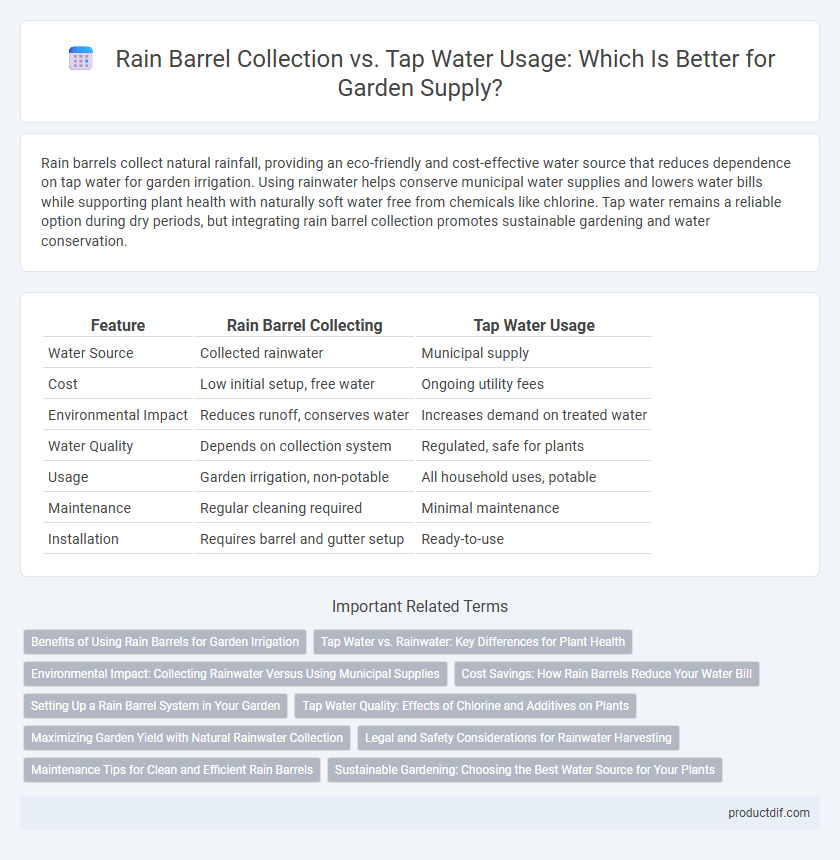Rain barrels collect natural rainfall, providing an eco-friendly and cost-effective water source that reduces dependence on tap water for garden irrigation. Using rainwater helps conserve municipal water supplies and lowers water bills while supporting plant health with naturally soft water free from chemicals like chlorine. Tap water remains a reliable option during dry periods, but integrating rain barrel collection promotes sustainable gardening and water conservation.
Table of Comparison
| Feature | Rain Barrel Collecting | Tap Water Usage |
|---|---|---|
| Water Source | Collected rainwater | Municipal supply |
| Cost | Low initial setup, free water | Ongoing utility fees |
| Environmental Impact | Reduces runoff, conserves water | Increases demand on treated water |
| Water Quality | Depends on collection system | Regulated, safe for plants |
| Usage | Garden irrigation, non-potable | All household uses, potable |
| Maintenance | Regular cleaning required | Minimal maintenance |
| Installation | Requires barrel and gutter setup | Ready-to-use |
Benefits of Using Rain Barrels for Garden Irrigation
Rain barrels significantly reduce tap water consumption by capturing and storing rainwater, offering a sustainable irrigation source that decreases water bills and conserves municipal water supplies. Using rainwater promotes healthier plant growth as it is free of chlorine and other chemicals commonly found in tap water. Gardeners benefit from enhanced soil moisture retention and reduced runoff, leading to improved plant vitality and environmental impact.
Tap Water vs. Rainwater: Key Differences for Plant Health
Tap water often contains chlorine and fluoride, which can affect soil microorganisms and plant health, while rainwater is naturally soft and free of chemicals, providing optimal hydration for plants. Rainwater's slightly acidic pH helps dissolve nutrients in the soil, enhancing nutrient uptake compared to the typically treated tap water. Using rain barrels to collect rainwater supports sustainable gardening by reducing dependence on municipal water and promoting healthier plant growth through natural hydration.
Environmental Impact: Collecting Rainwater Versus Using Municipal Supplies
Collecting rainwater in rain barrels significantly reduces reliance on municipal water supplies, decreasing aquifer depletion and lowering the energy footprint associated with water treatment and distribution. Rainwater harvesting mitigates stormwater runoff, which helps prevent soil erosion and reduces pollutants entering local waterways. In contrast, excessive municipal tap water usage often strains water infrastructure and contributes to higher greenhouse gas emissions due to treatment processes.
Cost Savings: How Rain Barrels Reduce Your Water Bill
Rain barrels collect and store rainwater, significantly reducing dependence on tap water for garden irrigation, which can lead to substantial cost savings on monthly water bills. Utilizing rainwater decreases the volume of municipal water consumed, especially during peak gardening seasons, lowering overall household water expenses. Investing in a rain barrel system not only conserves a natural resource but also minimizes the financial burden associated with increasing water rates.
Setting Up a Rain Barrel System in Your Garden
Installing a rain barrel system in your garden reduces dependence on tap water by capturing and storing rainwater for irrigation. Position the barrel under a downspout to maximize water collection, ensuring it has a secure lid and a spigot for easy access. Incorporate a fine mesh screen to filter debris and prevent mosquitoes, enhancing water quality and garden health.
Tap Water Quality: Effects of Chlorine and Additives on Plants
Tap water often contains chlorine and additives that can affect plant health by disrupting nutrient absorption and soil microbiomes. Prolonged exposure to chlorinated water may lead to leaf burn, reduced growth, and diminished yields in sensitive plants. Using rain barrels to collect natural rainfall provides chlorine-free water, supporting healthier, more vigorous garden growth and sustainable plant care.
Maximizing Garden Yield with Natural Rainwater Collection
Rain barrels capture and store natural rainfall, reducing reliance on municipal tap water and lowering water bills while providing plants with softer, chemical-free water that enhances garden growth. Using collected rainwater improves soil moisture retention and nutrient availability, leading to healthier plants and higher garden yields. Incorporating rain barrels into garden irrigation supports sustainable water management and optimizes crop productivity through efficient natural resource use.
Legal and Safety Considerations for Rainwater Harvesting
Rainwater harvesting through rain barrels is subject to varying legal restrictions depending on regional water rights and local regulations, making it essential to verify compliance before installation. Safety considerations include ensuring proper filtration and maintenance to prevent contamination from pathogens or debris, which can pose health risks when using collected rainwater for irrigation or non-potable purposes. Compared to tap water, rainwater harvesting reduces reliance on municipal supplies, promoting sustainability but requires adherence to specific legal frameworks and safety protocols to avoid potential liabilities.
Maintenance Tips for Clean and Efficient Rain Barrels
Rain barrels require regular cleaning and inspection to prevent algae growth, mosquito breeding, and clogging, ensuring clean water collection. Use fine mesh screens over inlets and outlets to keep debris and insects out while allowing proper water flow. Regularly check and clean downspouts and gutters to maintain efficient rain barrel function and water quality for garden use.
Sustainable Gardening: Choosing the Best Water Source for Your Plants
Rain barrels reduce reliance on municipal tap water by capturing and storing rainwater, offering an eco-friendly solution that conserves water and lowers utility bills. Using collected rainwater benefits plant health due to its natural, chlorine-free composition, unlike tap water which may contain chemicals that affect soil quality over time. Sustainable gardening thrives on water conservation techniques such as rain barrel harvesting, which supports environmental stewardship and enhances garden resilience during dry periods.
Rain barrel collecting vs Tap water usage Infographic

 productdif.com
productdif.com